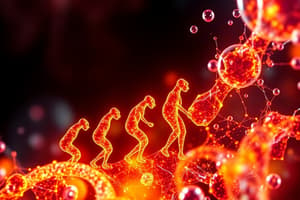Podcast
Questions and Answers
What is one important outcome of the process of evolution?
What is one important outcome of the process of evolution?
- The reduction of genetic diversity
- The evolution of biological complexity (correct)
- The stabilization of simple life forms
- The emergence of single-celled organisms
What has been a challenge in defining biological complexity?
What has been a challenge in defining biological complexity?
- Quantifying the rate of mutation
- Determining the number of existing species
- Measuring gene content, cell types, or morphology (correct)
- Classifying organisms into taxonomic ranks
What was the previously held belief by many biologists about evolution?
What was the previously held belief by many biologists about evolution?
- Evolution was a process leading to simpler organisms
- Evolution favored the survival of the largest organisms
- Evolution was progressive and directional (correct)
- Evolution was unpredictable and chaotic
How is the concept of 'progression' in evolution currently regarded?
How is the concept of 'progression' in evolution currently regarded?
What has been the trend concerning complexity in the history of life?
What has been the trend concerning complexity in the history of life?
What is a proposed metric for measuring biological complexity?
What is a proposed metric for measuring biological complexity?
What did many biologists used to believe about the direction of evolution?
What did many biologists used to believe about the direction of evolution?
What is the current understanding about the concept of 'progression' in evolution?
What is the current understanding about the concept of 'progression' in evolution?
What has been a challenge in defining biological complexity?
What has been a challenge in defining biological complexity?
What has been the trend concerning the maximum level of complexity over the history of life?
What has been the trend concerning the maximum level of complexity over the history of life?
Flashcards are hidden until you start studying
Study Notes
Evolution of Biological Complexity
- Evolution results in a wide range of biological complexity, but measuring complexity is challenging.
- Metrics for complexity include gene content, cell type diversity, and morphological traits.
Historical Perspectives on Evolution
- Traditionally, many biologists adhered to the idea of orthogenesis, viewing evolution as a progressive process.
- This viewpoint suggested a directional trend towards "higher organisms," but lacked substantial empirical support.
- The terms "high animals" and "low animals" emerged from this perspective, categorizing organisms based on perceived complexity.
Modern Understanding of Evolution
- Current consensus rejects the notion of a predetermined directional evolution, recognizing that natural selection operates without intrinsic direction.
- Organisms adapt with increased or decreased complexity based on their specific environmental contexts.
- Despite a historical trend towards greater maximum complexity, the majority of organisms are still relatively simple.
Studying That Suits You
Use AI to generate personalized quizzes and flashcards to suit your learning preferences.




